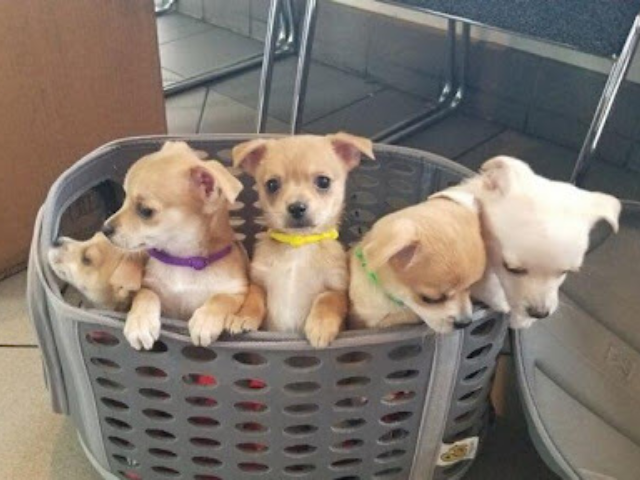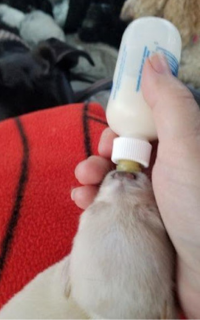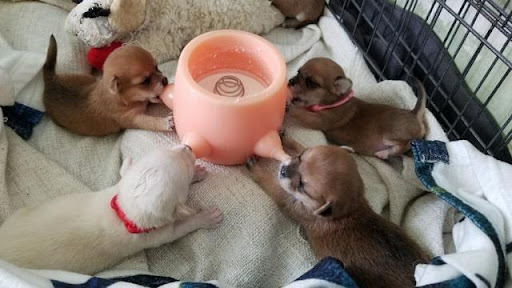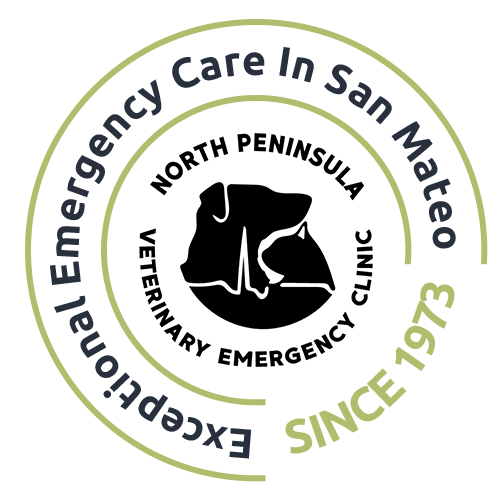Amie Chapman, RVT and Sophia Papageorgiou, DVM
A typical shift at a veterinary emergency hospital can be stressful and unpredictable. The caseload can vary from a few to numerous patients and the severity of patients ranges from minor problems to major concerns such as trauma, grave illness, and a need for lifesaving emergency surgeries. It is impossible to predict what might come through the door on any given day. The veterinary team must focus intently and make quick decisions while experiencing a normal range of human emotions and reactions, as well as helping pet owners with their own decisions and feelings. What’s more, as an emergency hospital where we often see patients only once, we do not always get to share the joy of their recovery. It’s no wonder that so many in our profession experience compassion fatigue, depression, and an increased risk of suicide.
 But every so often, a special patient can manage to lift our spirits in ways we could never have imagined. And sometimes, that patient is actually FIVE tiny patients - a basket of puppies, to be exact! Amie, our head veterinary technician, offered to foster five two-week-old chihuahua puppies who were surrendered to Animal Care and Control and then transferred to a local rescue group. Unfortunately, the puppies’ mother was not able to nurse them due to eclampsia.
But every so often, a special patient can manage to lift our spirits in ways we could never have imagined. And sometimes, that patient is actually FIVE tiny patients - a basket of puppies, to be exact! Amie, our head veterinary technician, offered to foster five two-week-old chihuahua puppies who were surrendered to Animal Care and Control and then transferred to a local rescue group. Unfortunately, the puppies’ mother was not able to nurse them due to eclampsia.
Eclampsia is a life-threatening drop in blood levels of calcium that can occur in some nursing dogs. We often see this in small breed dogs and when the puppies are one to four weeks of age. Also called puerperal tetany, milk fever, or hypocalcemia, eclampsia can cause agitation, muscle tremors, seizures, and even death if not treated right away. Signs of eclampsia include restlessness, panting, and stiff movements, or even the inability to walk. This soon progresses to muscle spasms (tetany) affecting the whole body, which can quickly escalate to convulsions. Immediate intervention at your closest veterinary emergency hospital is necessary to save the mother’s life.
 Most dogs with eclampsia will respond well to prompt treatment, which is luckily what happened in this case. However, the original owners were not able to care for these five little souls who needed round-the-clock care. Puppies two weeks old are completely dependent on the instinctive care of their mother (or someone willing to intervene) to feed them every two to four hours, stimulate them to urinate and defecate, and provide external warmth to keep their body temperature within normal range. Caring for a litter of puppies is a lot of work, but also brings great fulfillment to those involved in their care. The feeding schedule is exhausting and disruptive to one’s sleep and work schedule, but watching the puppies grow and thrive makes it all worthwhile.
Most dogs with eclampsia will respond well to prompt treatment, which is luckily what happened in this case. However, the original owners were not able to care for these five little souls who needed round-the-clock care. Puppies two weeks old are completely dependent on the instinctive care of their mother (or someone willing to intervene) to feed them every two to four hours, stimulate them to urinate and defecate, and provide external warmth to keep their body temperature within normal range. Caring for a litter of puppies is a lot of work, but also brings great fulfillment to those involved in their care. The feeding schedule is exhausting and disruptive to one’s sleep and work schedule, but watching the puppies grow and thrive makes it all worthwhile.
 For the next six weeks, these five puppies came to the hospital every day with Amie. Whenever they entered the building, the entire team welcomed them with open arms and fought over who could cuddle them first. The puppies transitioned from individual bottle feedings to nursing on a silicone multi-feeder and always grew excited when feeding time came around. They craved being cuddled after eating and sought a warm lap for cuddling sessions. As they grew, their care became more than just feeding, keeping them warm, and stimulating them to pass urine and stool. Once they learned to eliminate on their own, their perpetual messes required constant clean-up duties and frequent “bottom baths.” Behavioral stimulation with different toys helped them develop mentally and physically. Socialization with humans was also vital for them so that they could eventually be integrated into their forever homes.
For the next six weeks, these five puppies came to the hospital every day with Amie. Whenever they entered the building, the entire team welcomed them with open arms and fought over who could cuddle them first. The puppies transitioned from individual bottle feedings to nursing on a silicone multi-feeder and always grew excited when feeding time came around. They craved being cuddled after eating and sought a warm lap for cuddling sessions. As they grew, their care became more than just feeding, keeping them warm, and stimulating them to pass urine and stool. Once they learned to eliminate on their own, their perpetual messes required constant clean-up duties and frequent “bottom baths.” Behavioral stimulation with different toys helped them develop mentally and physically. Socialization with humans was also vital for them so that they could eventually be integrated into their forever homes.
 |
These five darlings quickly grew from little potatoes who just ate, slept, peed, and pooped, to full-blown rascals who wrestled with each other and wanted to interact with everyone around them. Whenever we had a day of tough and sad cases, these little souls buoyed our spirits with their hilarious antics and boundless affection. There is a reason why there are comfort dogs for people who experience trauma or loss. They sometimes seem magical in how they can make people and other animals feel better merely by their presence. A pet on the head, a nose nuzzle, a lick on the face, or a full-body  hug can go a very long way. Every member of the NPVEC team had a hand in these puppies becoming extremely well-socialized and comfortable around people. When the time came for them to return to the rescue for adoption, we were sad to see them go, but we were just as joyful to see our thriving puppies find their forever homes. These little puppies brought a lot of joy to our hospital during their time here, and we are grateful that we were able to provide them with what they needed to become great companions.
hug can go a very long way. Every member of the NPVEC team had a hand in these puppies becoming extremely well-socialized and comfortable around people. When the time came for them to return to the rescue for adoption, we were sad to see them go, but we were just as joyful to see our thriving puppies find their forever homes. These little puppies brought a lot of joy to our hospital during their time here, and we are grateful that we were able to provide them with what they needed to become great companions.
So, who saved who? Did the staff help the puppies more by feeding them and providing the care they needed to develop and grow? Or did the puppies help the team by providing comfort, joy, laughs, and lowering stress levels during many challenging ER moments? Either way, it was a win-win for the puppies as well as the ER team, and an experience we will not soon forget.
 |
